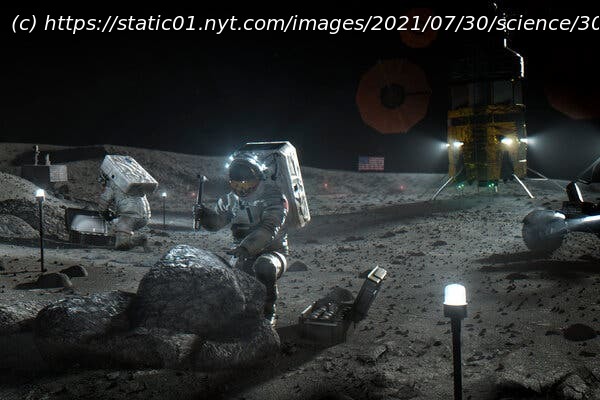The Government Accountability Office said a $2.9 billion award to SpaceX to build the next lunar lander for astronauts would stand.
Jeff Bezos’ rocket company carried him to the edge of space last week. But it won’t be flying NASA astronauts to the moon’s surface, at least for now. The Government Accountability Office on Friday rejected protests challenging NASA’s decision to go with just one spacecraft lander design for its return of astronauts to the moon, a $2.9 billion award that went to Elon Musk’s rocket company, SpaceX. The competition for the contracts was seen as a battle of billionaires between Mr. Musk and Mr. Bezos, the founder of Amazon who also started a rocket company, Blue Origin. A third company, Dynetics, a defense contractor in Huntsville, Ala., was also competing for the contract. In a twist, the loss of the protest may actually help Blue Origin. If the G.A.O. had upheld the protest, NASA may have had to redo the competition, which seeks a system that can take astronauts from lunar orbit to the surface of the moon and back. Redoing the competition would most likely have taken months. NASA officials can now decide whether to take up Mr. Bezos on an offer he made in an open letter to Bill Nelson, the NASA administrator, on Monday: to effectively slice $2 billion off the $6 billion proposal from Blue Origin, which collaborated with Lockheed Martin and Northrop Grumman. When the competition was announced, NASA officials said they wanted more than one design to ensure both competition and redundancy in case one of the companies stumbled. But in April, NASA announced that it was awarding just one contract, to SpaceX. The company will use the money for the development of Starship, the large reusable spacecraft the company is developing in South Texas, that is central to Mr. Musk’s ambitions of one day sending people to Mars. Space agency officials suggested then that they were hemmed in by limited budgets. Congress had provided $850 million in the current fiscal year for the project, one-fourth of what the Trump administration had asked for in its final budget request.






